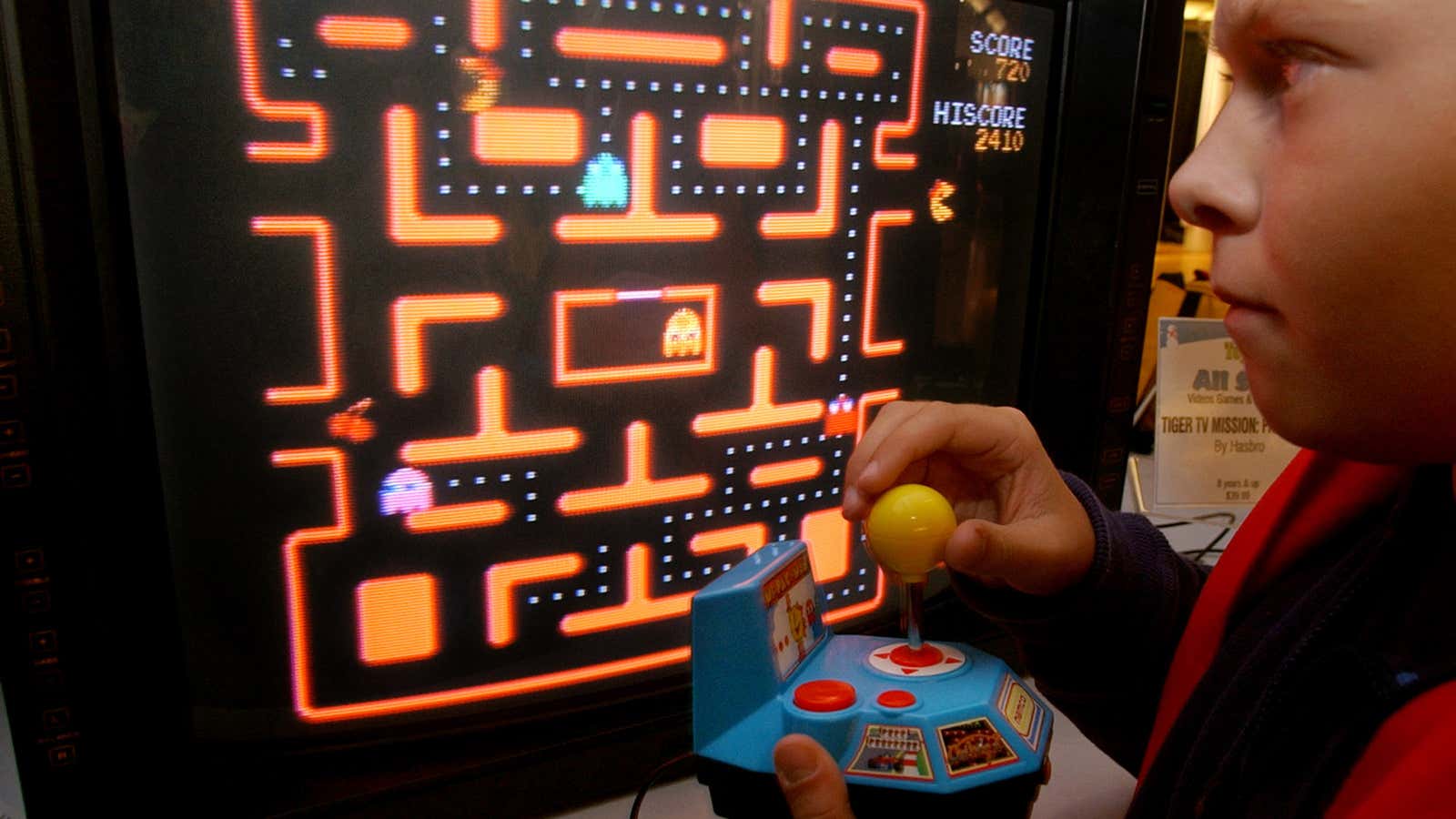This story is part of What Happens Next, our complete guide to understanding the future. Read more predictions about the Future of Gaming.
Written literacy is a recent invention, in evolutionary terms. Though anthropologists believe we’ve been using some form of spoken language for about 100,000 years, we only started reading and writing about 5,000 years ago. (On the scale of evolutionary biology, that’s no time at all.)
The process of acquiring written literacy is therefore sort of a brain hack. In order to read, our brains had to appropriate and modify existing modules that were originally dedicated to listening and talking. When we learned how to read and write, we were augmenting existing hardware—splicing together old systems in order to create a special visual interface that was originally built for processing sound.
That’s what literacy looks like: the glacial grind of evolution trying to keep up with the break-neck pace of human inventions, institutions, and cultures.
Spoken, written, and verbal literacy have all come about as a consequence of societal and intellectual revolutions. So what new form of literacy will our hijacked and re-programmed brains need to understand in the future?
The answer is systems literacy.
What is systems literacy?
Systems literacy involves thinking in models, math, and logic. Instead of pens and vocal chords, it uses computers to read and write software.
Systems literacy is as different from written literacy as reading and writing are different from speaking and listening. Written literacy is grounded in pictures and stories: vivid, concrete time-slices of lived experience. Systems literacy is about the logic that produces those stories: the conditional networks of potential experience, the possibilities that model what can happen. It’s about prediction, simulation, and explanation.
Creating this literacy will involve a similar process of recruiting and modifying existing brain hardware as we did for reading and writing. And games have a role to play in this process.
Games are full of paradox: the strict determinism of rules versus the disruptive improvisation of play; the power of memorization and calculation versus the power of imagination and intuition; the careful deliberation of conscious choice versus the instantaneous impulse of immediate action; the organizing rhythm of pattern versus the irreducible flow of nebulosity. These paradoxes all reflect the underlying dynamic in a systems-based world—a view in which the messy, organic, and surprising quality of everything around us emerges from the mechanical operation of simple rules.
The promise of systems literacy is that it will give us the capability to better navigate the complicated world we live in now. Our lives take place in an increasingly interconnected world of subtle causal relationships, surprising outcomes, and unpredictable second- and third-order effects. The world has always been made up of systems, but in the information age, systems proliferate rapidly, evolve and change constantly, and exert increasing levels of influence over our lives.
Consider broadcast news from 50 years ago. Of course there was a system that determined what Walter Cronkite said each night, but understanding how that system operated wasn’t a necessary skill for consuming the news. Now, in the age of digital media, understanding the systems that produce and distribute news and choosing between them is a difficult and important life skill. The same is true of all the challenges we will face in the coming century. Want to survive climate change? Address inequality? Fix healthcare? We won’t do it using instinct and tradition, and we won’t do it with simple stories and pictures.
We need a mode of thinking that incorporates both the messy approximations of probability and the precise logic of algorithms—a mode of thinking that understands sensitivity to initial conditions, feedback loops, and variance. This new way of interacting with and understanding the world will be vital to be able to thrive in the coming centuries.
Can games help us develop such a mode of thinking? It’s reasonable to suggest they could. After all, games are systems. When you dodge enemies in Dark Souls, weigh moral trade-offs in Papers Please, or scan the board looking for the best move in Candy Crush, you are interacting with systems, letting the push and pull of rules and play wash across the contours of your brain.
Sometimes in games we plunge into systems and let them carry us away, sometimes we examine them carefully, turning them over in our hands to understand how they work. But all games provide an opportunity to develop the skills of systems literacy: a greater sensitivity to how systems work to generate the complex world around us.
If humanity is on such a path, we shouldn’t expect it to be a short one. The development of written literacy was a vast historical and cultural journey—a journey that included inventions, institutions, traditions, and revolutions. It transformed our way of thinking and interacting with the world so utterly that it’s almost impossible to comprehend a time before it.
When we play games, we are taking the first hesitant steps of a new journey toward a new type of literacy. Where will this one take us?
This story is part of What Happens Next, our complete guide to understanding the future. Read more predictions about the Future of Gaming.
